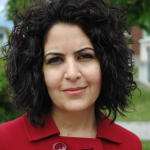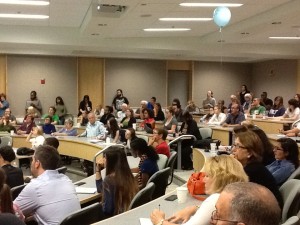A packed room, including people from outside the university, greeted Rania Masri in the Liberal Arts building Monday night, waiting to hear her expertise on an issue currently roiling the political climate in the U.S. and around the world: Syria.
Masri, a professor at the University of Balamand in Lebanon, laid out the U.S. case leading up to the current unrest in Syria, as well as what might happen as a result of U.S. military action there.
“I went in to be informed about the American stance and options,” wrote Towson University student Krystal Escoffery ’16 in an email to event organizer and history professor Kimberly Katz, “but overall [I] got to observe a whole sociological side to the problems in Syria, not to mention how different members of society interact.”
Members of the Arab-American and Syrian-American communities in the Towson area turned out to hear Masri’s take on the issue, with some voicing opposition to Masri’s stand against American military action. They joined students from Towson, Goucher College and UMBC. The discussion that followed Masri’s presentation was so engaging that about 20 people stayed for half an hour after the event to discuss it with Masri, whose perspective notes that American interests in the country are essentially only geo-strategic. She says they are aimed at fighting the rising Russian influence while supporting Israel, Jordan and Turkey, and putting down the Shi’ite collaboration between Iran, Hizbullah and Syria. Her stance generated a great deal of discussion, some of it tense.
“It was interesting to see how people who disagreed reacted to each other,” wrote Escoffery. “I understand we are all from different walks of life, thus our opinions are formed due to our different realities.”
Pointing out the differences in cases, Masri explained that the U.S. has no oil interest in this conflict as it did in Libya, Iraq and Afghanistan. In contrast to the situation in Egypt, the U.S. has no historic relationship with Syria. Rather, she said, the case for an American strike on Syria is based on the support of the “rebels”—without knowing entirely who the “rebels” are but knowing that some of them can be traced back to al-Qaeda. Masri and others have pointed out this means it’s difficult to know who the “good guys” are and who the “bad guys” are.
Masri’s presentation was sponsored by the History, Political Science and Geography and Environmental Planning departments.


